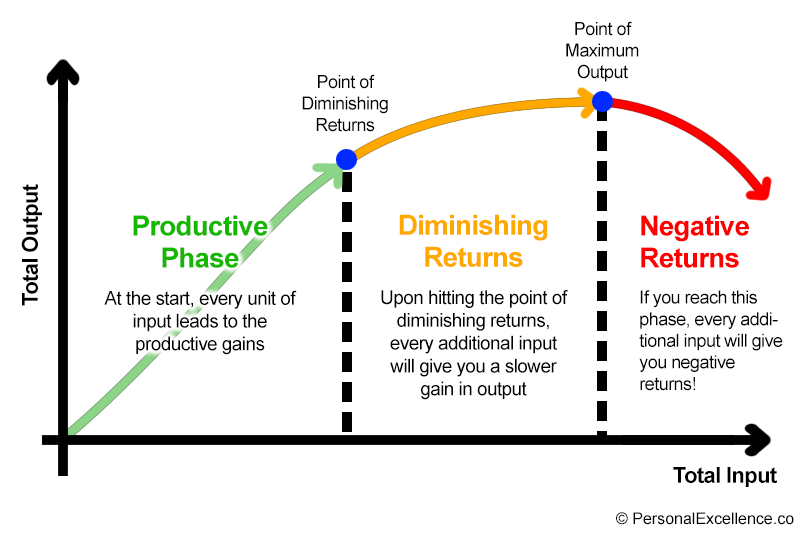You want to hustle so bad... but it's just not happening.
Here's how to actually work hard, get lots done, and find your way to success—without burning out.
Hey,
Fresh article for you this week on the right way to hustle hard and get things done. You can check it out on Reddit (plus comment, upvote, etc), or read it below. ✌️
It’s become popular to vilify hustle culture. To label toxic the idea that, if you want to achieve your dreams, you need to work as much as humanly possible and disregard everything else—sleep, time-off, relationships—to get things done.
But there's nothing wrong with extolling the virtues of hard work. In fact, that’s the origin of term “work-ethic”. It’s the belief that work is “good” in and of itself. That it’s right to derive a strong sense of purpose from your job, quest or ambition. It's moral to pursue ideals of diligence, perseverance, responsibility, commitment and punctuality.
It's perfectly fine to dream of having a massive positive impact on the world.
It’s perfectly fine to doggedly insist that you were put on this planet to hustle hard, get stuff done, meander your way to success, while reaping a little reward along the way.
If that’s labelled as “hustle culture”, so be it. Because what hustle culture gets right is the fact that success won't come easy; that's especially true if there's tons of competition, or if you’re pushing at the fringes of human advancement.
What it gets wrong, however, is how.
When you neglect to take care of yourself, your capacity to work suffers.
Depriving sleep means it's harder for you to focus and you'll make costly mistakes. Eating quick garbage meals means you'll have to deal with brain fog and sugar crashes. Skipping relaxation time means your creativity will suffer.
At a certain point, trying to do more will eventually lead to you doing less. It’s the law of diminishing returns which, if really pushed, eventually leads to negative returns as illustrated (source: personalexcellence.co)
…
Of course you already know this—although it doesn’t hurt to be reminded. So the question becomes how? How do you find that sweet spot; the point where you’re maximizing your productivity, creativity, and output… while keeping things sustainable and enjoyable?
You need to start with a bunch of checks.
Check your assumptions: stop for a second and think: what are you taking as granted? What have you been doing—or not doing—under the premise that it’s leading to a greater productive output? What are you pushing to later, based on the assumption that it’s not worth the added time/effort?
Check your feelings of urgency: urgency can get in the way of making sensible, long-term focused decisions. It can have you neglect practices like exercise and self-care, which, yeah consume large chunks of time, but are entirely worthwhile investments. Sometimes, sure, the house is on fire and you need to act fast to put it out… but sometimes (most often?), it's an obnoxious false-alarm that can silenced.
Check for feelings of impatience: similarly, you might be itching to work on a single task, wanting for this or that outcome. As such, you’re primed to rationalize neglecting activities that don’t directly bring you there, such as exercising or proper self-care. But these things do get you there. It’s just indirect and less obvious, but they're still crucial for you to amble your way to the goal.
My mantra? Go slow to go fast. The more you prioritize these indirect activities, the “slower” and more diligent you'll go, the better you’ll perform when you engage in your direct activities. It’ll feel a bit wonky, like you’re doing "unessential" actions, but in the end, what feels unessential is precisely the opposite.
Check for unsustainable practices: Are you grinding way too hard… borrowing some of tomorrow’s productivity today?
Check for opportunities to say “no”: Get smart about what you take on. Having a high work-ethic doesn’t mean saying yes to everything on impulse. It means doing a lot of the right thing and none of the wrong thing.
Check for symptoms of being past the sweet-spot: are you drained of motivation and energy? Are you finding yourself diddling around with low-priority work? Are you making mistakes, dealing with relentless writer’s block or finding things more challenging? Are you moody, impatient, or finding yourself less passionate about the work? If so, yeah, you need to scale it back a little. You need to revert to some R&R self-care.
From there, iterate through trial and error. Though they can inform you, no Reddit post, blog article or self-help book will tell you exactly how to find your sweet-spot of productivity. Start somewhere, go for a while, assess your progress through those checks and some basic metrics, then adapt. Rinse and repeat until you find your optimal rhythm.
That’s how you get to the sweet-spot of returns. That’s how you maximize your productivity and reach success. That's how you hustle the right way.
- Simon ㋛
PS: If you haven't already, sign up for our free 30-day Discord program. It will give you the support and accountability you need to start the year right with new, healthy habits and routines. Register right here.



